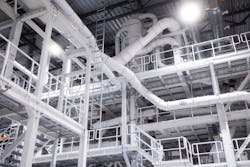Northvolt Selects ABB for Electrification at Swedish Battery Recycling Plant
Swiss-based ABB will provide electrification and automation technology for what may become the world’s largest battery recycling facility in Sweden.
Northvolt is contracting ABB to handle electrification solutions for its planned Revolt Ett facility. Revolt Ett is being designed to eventually process 125,000 metric tons of end-of-life batteries.
The agreement continues a relationship with Northvolt going back to the company’s gigafactory manufacturing lithium-ion batteries in Skellefteå. The gigafactory and recycling facility will work side-by-side.
ABB will deliver switchgears and variable speed drives to the facility. This equipment is intended to match the speed of the processes happening at the given moment, making the plant more efficient performance and maintenance-wise, according to the company.
“This is ABB’s first order within the strategically important battery recycling segment,” said Staffan Södergård, Business Unit Manager, Battery Manufacturing, Process Industries, ABB, in a company announcement about the project. “In conjunction with a trusted partner in Northvolt, this project offers us the opportunity to help our customers avoid carbon emissions, reuse material, and protect critical supply chains. We look forward to its progress.”
The Skellefteå facility is planned to begin recycling activities later this year. The gigafactory opened its first production line in 2022.
“Batteries are a critical technology within the energy transition,” said Emma Nehrenheim, Chief Environmental Officer at Northvolt, in the release. “But with massive growth in battery demand it is critical that we secure solutions to recycle batteries and ensure reliable, sustainable supply of critical minerals. This new facility Revolt Ett will help us achieve both of these goals as we work towards our mission of building the world’s greenest battery.”
The global demand for lithium-ion batteries, spurred by both utility-scale energy storage and transportation electrification, is expected to grow 30 percent annually and reach a $400 billion market size and 4.7 TWh in production capacity by 2030, according to McKinsey & Co.
This vast expansion in battery capacity will also necessitate a more circular economy and supply chain around the sector. Consumer-type end-of-life batteries, such as those in cell phones and laptops, can help lessen the strain on battery element demand, according to the U.S. Environmental Protection Agency.
“Safe recycling of lithium-ion batteries at the end of their lives conserves the critical minerals and other valuable materials that are used in batteries and is a more sustainable approach than disposal,” reads the EPA primer.
Companies announcing plans for battery recycling facilities in the U.S. include Cirba, Ascend Elements, Eco-Bat and Li-Cycle, among others.
At the Northvolt plant in Sweden, Revolt Ett’s battery materials recovery and hydrometallurgical processes are expected to supply up to 50% of the facility’s raw needs for lithium, nickel, cobalt and manganese by 2030, according to the company. Overall, Northvolt hopes to reach 150 GWh in annual manufacturing capacity across its operations in Sweden and Germany.
Lithium is highly flammable and toxic in landfills. Runoffs from lithium mines have reportedly cause wildlife death and damage in the past, and the extraction process uses a vast amount of water, according to reports.
Catch even more stories about the C&I Energy Transition by subscribing to our free EnergyTech Newsletter
About the Author
Rod Walton, EnergyTech Managing Editor
Managing Editor
For EnergyTech editorial inquiries, please contact Managing Editor Rod Walton at [email protected].
Rod Walton has spent 17 years covering the energy industry as a newspaper and trade journalist. He formerly was energy writer and business editor at the Tulsa World. Later, he spent six years covering the electricity power sector for Pennwell and Clarion Events. He joined Endeavor and EnergyTech in November 2021.
Walton earned his Bachelors degree in journalism from the University of Oklahoma. His career stops include the Moore American, Bartlesville Examiner-Enterprise, Wagoner Tribune and Tulsa World.
EnergyTech is focused on the mission critical and large-scale energy users and their sustainability and resiliency goals. These include the commercial and industrial sectors, as well as the military, universities, data centers and microgrids. The C&I sectors together account for close to 30 percent of greenhouse gas emissions in the U.S.
He was named Managing Editor for Microgrid Knowledge and EnergyTech starting July 1, 2023
Many large-scale energy users such as Fortune 500 companies, and mission-critical users such as military bases, universities, healthcare facilities, public safety and data centers, shifting their energy priorities to reach net-zero carbon goals within the coming decades. These include plans for renewable energy power purchase agreements, but also on-site resiliency projects such as microgrids, combined heat and power, rooftop solar, energy storage, digitalization and building efficiency upgrades.

